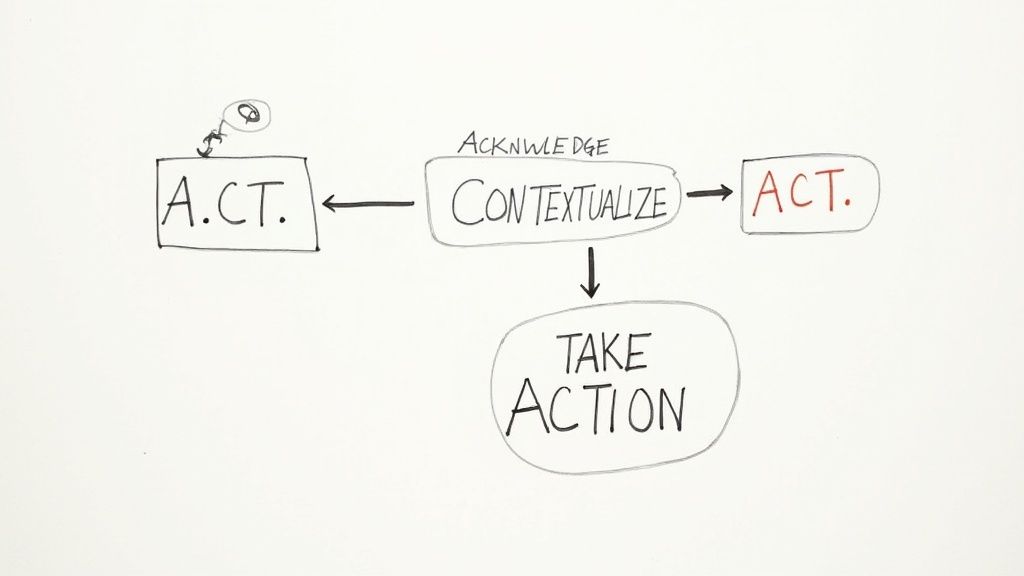
response to negative review
response to negative review: Turn Feedback into Brand Wins
Posted on Oct 26, 2025

Responding to a negative review is so much more than damage control. When done right, it flips a poor guest experience into a powerful marketing moment. Your reply is a public declaration of your commitment to guest satisfaction—not just for that one guest, but for every single person who might book with you in the future.
Why Negative Reviews Are Unavoidable Opportunities

Let's be real: getting a negative review stings. It's only natural to get defensive after you've poured your heart and soul into creating an amazing stay. But what if we stopped seeing them as an attack and started treating them as a critical business opportunity? Getting your mindset right is the first, most important step in mastering your response game.
Every single negative review gives you a stage to publicly showcase your professionalism and problem-solving chops. Remember, your audience isn't just the guest who left the comment. It's every potential traveler scrutinizing your listings. A thoughtful, empathetic, and professional response can often be more convincing than a dozen glowing five-star ratings.
Turning Criticism into Credibility
Think about it. A page full of nothing but perfect five-star reviews can sometimes feel a little too perfect, almost suspicious. A few less-than-perfect reviews, handled with grace, actually add a layer of authenticity and trust to your profile. It proves you're a real business that, while not flawless, is absolutely dedicated to making things right. That builds a kind of credibility a perfect record just can't.
And the data backs this up. Actively engaging with feedback makes a huge difference. In fact, a whopping 88% of consumers say they're more likely to book with a business that replies to all of its reviews—good and bad. On the other hand, 60% of consumers will simply move on after seeing just one negative comment that's been ignored.
Your response is a billboard for your brand's values. It tells future guests: "Even when things go wrong, we care, we listen, and we take action." This message is incredibly powerful for building booking confidence.
Ultimately, each piece of negative feedback is an invaluable, unfiltered gift. It shines a light on blind spots you might have in your operation, from a spotty Wi-Fi connection to check-in instructions that aren't quite clear enough. By treating this feedback as a tool for improvement, you can fix issues so they never affect another guest. This proactive approach is a cornerstone of effective online reputation management for hotels and STRs alike.
A Practical Framework for Your Response

When a negative review lands in your inbox, the gut reaction is often a mix of frustration and defense. It’s easy to get emotional. But firing off a hasty reply is almost always a mistake.
The key is to step back and rely on a process. Having a simple, repeatable framework keeps emotion out of it and ensures your response to a negative review is professional, constructive, and helpful to future guests every single time.
We swear by a simple framework called A.C.T., which stands for Acknowledge, Contextualize, and Take Action. It’s a reliable structure that shows the unhappy guest they’ve been heard while demonstrating your commitment to quality for everyone else reading along.
Let's break down how it works.
Acknowledge Their Experience
First things first: you have to validate the guest's feelings. This isn't about admitting you were wrong; it's about showing you're listening. A guest who feels ignored is a guest who gets louder. Your opening line can pour water on the fire immediately.
Start by thanking them for their feedback—yes, even when it stings. Then, mention the specific problem they brought up. This small detail proves you're not just sending a canned response.
- Here’s what that looks like: "Hi Sarah, thank you for taking the time to share your feedback with us. We were very concerned to read about the issues you experienced with the Wi-Fi during your stay."
See how that sets a completely different tone? You're not starting a fight; you're starting a conversation.
A genuine acknowledgment is the foundation of a successful reply. It tells the original guest and all future readers that you are a host who listens.
Provide a Little Context (No Excuses)
After you’ve acknowledged their point, you can add a bit of factual context. I have to stress this: the goal is not to make excuses or get into a back-and-forth debate. You're simply providing a brief, clear explanation for future guests who are trying to decide whether to book with you.
Keep it short, professional, and non-defensive. If you messed up, own it. If something unexpected happened, explain it calmly.
- For that Wi-Fi issue, you could say: "We're so sorry the connection was unreliable. We discovered after your departure that a regional service outage had been affecting our area intermittently, which our provider has since resolved."
This works because it's factual, doesn't blame the guest, and reassures potential bookers that the problem was a one-off and has been handled. That’s exactly the information they need.
Show What You’re Doing About It
This is the most critical part of the whole response. You must show what you’ve done—or are doing—to fix the problem. This is where you turn a negative into a positive. Vague promises like "we'll look into it" mean nothing. Specifics are everything.
Tell future guests exactly what you’ve changed to make sure this problem never happens again. It screams accountability and shows you’re serious about providing a great experience.
- Finishing the Wi-Fi response: "To prevent this from happening again, we have now installed a secondary backup internet connection. We want to ensure all our guests can rely on a fast, stable connection, whether they're working remotely or streaming a movie."
That simple sentence is incredibly powerful. It tells every future reader that you take feedback seriously and actively improve your property. To build on this, it’s always a good idea to ground your guest communication in essential customer support best practices, which can help refine your entire approach.
To help you put this all together, here's a quick guide on the right and wrong ways to apply the A.C.T. framework.
The A.C.T. Framework Do's and Don'ts
| Framework Step | What to Do (The Right Way) | What to Avoid (Common Mistakes) |
|---|---|---|
| Acknowledge | Thank the guest and mention their specific complaint. Use their name. | Using a generic, copy-paste reply that feels impersonal. |
| Acknowledge | Show empathy, e.g., "I'm sorry to hear about the trouble you had." | Becoming defensive or questioning their experience. |
| Contextualize | Provide a brief, factual explanation for the issue. | Making long-winded excuses or blaming the guest. |
| Contextualize | If you were at fault, own it directly and apologize. | Shifting blame to outside factors without taking responsibility. |
| Take Action | State the specific, concrete steps you've taken to fix the problem. | Making vague promises like "We'll do better next time." |
| Take Action | Focus on how the solution benefits future guests. | Offering a private discount or refund in the public reply. |
Following this framework doesn't just resolve a single bad review—it builds trust and credibility with every potential guest who reads it. It’s your best tool for turning a public complaint into a powerful marketing message.
Handling Unfair or Fake Reviews Professionally

Sooner or later, every host gets a review that just doesn’t feel right.
While most negative feedback comes from a place of genuine (if sometimes misplaced) disappointment, you will eventually encounter one that’s wildly exaggerated, completely false, or maybe even meant for a different property altogether. It’s infuriating, but handling it correctly requires a calm, two-pronged approach.
First, report the review. Second, post a public response. And yes, you should do both. Reporting it is your chance to get it removed, but there's no guarantee the platform will agree, and the process can drag on. Your public reply is your insurance policy, ensuring that any potential guest who sees the review in the meantime gets the full story.
Unfortunately, the problem of fake and misleading reviews is only getting worse. It's estimated that a staggering 30% of all online reviews are fake, and around 82% of consumers have stumbled upon them. The rise of AI-generated content has poured fuel on this fire, forcing platforms to try and keep up. You can dig into more data on this trend to see just how big the problem is.
How to Report a Suspicious Review
Before you even think about writing your public response to a negative review, pause and assess if it actually violates the platform’s policies. Both Airbnb and Vrbo have specific rules against reviews that are:
- Retaliatory: The guest is lashing out after you had to enforce a house rule or charge a fee.
- Irrelevant: The review complains about things outside your control, like the local weather or a flight delay.
- Extortionary: The guest threatened a bad review to get a discount or a refund.
- Not from the guest: The person who wrote the review wasn't actually the person who booked and stayed at your property.
If the review ticks one of these boxes, it's time to build your case. Gather any and all evidence you have—screenshots of messages, timestamped photos from your cleaners, or any other documentation that proves your side.
When you submit it through the platform’s resolution center, be concise and stick to the facts. Let the evidence do the talking.
Crafting a Calm and Factual Public Reply
While you wait for the platform to investigate your report, you need to post that public response. Remember, your audience isn't the guest who left the review; it's every future guest who might read it. The goal isn't to win an argument, it's to showcase your professionalism.
Let’s say a guest leaves a review claiming your meticulously cleaned property was "filthy," but you have time-stamped photos from your cleaning crew taken just hours before they checked in.
Bad Response: "This is a complete lie. The apartment was professionally cleaned right before you arrived and we have pictures to prove it. You’re just trying to get a refund."
This kind of reply comes across as defensive and aggressive. It makes you look difficult and will put future guests on edge.
Now, let's try a different approach.
Good Response: "Hi [Guest Name], we were surprised and concerned to read your comments about cleanliness, as this is our highest priority. Our professional cleaning team documents their work with time-stamped photos before every check-in, and the images from your arrival day show the unit in immaculate condition. We wish you had reached out during your stay so we could have addressed any concerns immediately."
See the difference? This response is firm but professional. It calmly corrects the record for anyone reading, shows you are a diligent and reasonable host, and does it all without attacking the guest. That's how you turn a negative into a net positive for your business.
The Hidden Financial Impact of Your Reply

Every time you sit down to write a response to a negative review, you’re not just typing a message—you’re making a financial decision. The line between your replies and your revenue is a lot more direct than most hosts think. Ignoring even one bad comment can quietly steer dozens of potential guests to your competitors, creating a slow leak in your booking pipeline that really adds up over time.
This isn’t just a hunch. Research shows that a single negative review can scare off up to 30 potential customers. But here's where it gets interesting. The data also reveals a surprising twist: businesses with a small number of negative reviews (around 15-20%) actually see 13% higher revenue than those with spotless records. You can dig into the numbers yourself and see how review authenticity impacts sales at Sixth City Marketing.
Authenticity Builds Trust and Revenue
Why would a less-than-perfect record actually make you more money? It all comes down to trust.
Today’s travelers are sharp. A listing with hundreds of glowing five-star reviews and nothing else can feel a little… fake. A few professionally handled negative reviews, on the other hand, give your listing a dose of reality. They show you’re a real person managing a real property, not some faceless company scrubbing its profile clean.
When a potential guest sees you handle criticism with grace, transparency, and a genuine desire to fix things, it does more than just smooth over one complaint. It builds a powerful sense of trust that money can't buy.
Your thoughtful reply sends a clear signal to every future guest who reads it: "Even if something goes wrong, this host is professional, responsive, and will make it right." That confidence is often the final nudge a guest needs to hit "Book Now."
Calculating the ROI of Your Responses
This trust translates directly into higher booking conversion rates. When guests feel confident that you’ll have their back, they are far more willing to commit their travel budget to your property. By turning a negative into a public display of incredible customer service, you’re not just doing damage control—you're actively marketing your reliability.
This is exactly why keeping an eye on your reputation management is so important. When you understand which of your efforts are bringing in the most bookings, you can double down on what works. In the end, effectively managing your online reputation is a critical part of figuring out how to measure marketing ROI for your STR business and ensuring your time is spent where it counts the most—on your bottom line.
Using AI as Your Response Co-Pilot
Let's be honest, getting a negative review is a gut punch. It’s not just the time it takes to respond; there's a real emotional drain that comes with it. Staring at a blinking cursor, trying to craft a reply that’s both professional and genuinely empathetic, is one of the toughest parts of being a host.
This is exactly where AI tools come in—not to replace you, but to act as an incredibly capable co-pilot.
The idea isn’t to outsource your guest relationships to a robot. Think of it more as a way to beat the "blank page" syndrome. An AI tool can whip up a solid, well-structured first draft in seconds, taking that initial emotional sting and mental block out of the equation. This lets you skip right to the important part: refining the message and making it your own.
Crafting the Perfect Prompt
The magic of an AI-generated draft is all in the instructions you give it. To get something truly useful back, you need to feed the AI the right context. Just pasting in the review and saying "write a reply" won't cut it.
You need to give the AI the key ingredients to work with.
- The Original Review: Drop in the full text of the guest's comment.
- Key Issues: Boil down the main complaints into a few bullet points (e.g., "Guest complained about slow Wi-Fi" or "Felt the check-in instructions were confusing").
- Desired Tone: Tell it how you want to sound. Use words like "empathetic," "professional," "apologetic," or "firm but fair."
- Your Context: This is crucial. Briefly add your side of the story or explain what you did about it. For example, "The Wi-Fi issue was a regional outage that has since been fixed."
Giving it this kind of targeted input helps the AI create a response to a negative review that's miles ahead of a generic template and already sounds a lot more like you.
From Draft to Final Polish
Once you have that AI-generated draft, it's your turn to work some magic. This is where you inject your personality and the specific details that no algorithm can ever fully replicate. The draft gives you the structure—that A.C.T. framework we talked about—and you provide the soul.
Scan the draft for places to add small, specific details that show you truly heard the feedback. Mentioning the property by name or referencing a unique feature can instantly make the response feel less canned and more personal.
Pro Tip: My favorite trick is to edit the AI draft so it sounds exactly like something I would say out loud. Read it. Does it sound stuffy or robotic? Rework it until it flows naturally. The best AI-assisted responses are the ones that nobody would ever guess were AI-assisted.
This co-pilot approach saves a massive amount of time and emotional energy. It helps you keep your replies consistently professional, even when you’re feeling the heat. By letting the tools handle the heavy lifting of a first draft, you can focus on what really counts: letting your genuine care for your guests shine through.
And this is just one piece of the puzzle. Exploring how to use AI to automate your short-term rental business can open your eyes to even more ways to streamline your workflow without sacrificing that all-important human connection.
Answering the Tough Questions About Negative Reviews
When you're dealing with a tough review, it's easy to get stuck. A handful of tricky situations pop up time and time again for hosts. Having a clear game plan for these common questions can be the difference between a panicked, defensive reply and a professional response that actually builds your brand.
Let's walk through some of the dilemmas that hosts face most often.
How Fast Should I Reply?
The golden window for responding to a negative review is within 24 to 48 hours. This timing really is the sweet spot.
It shows you’re paying attention and that you take guest feedback seriously. But just as importantly, it gives you enough breathing room to step away from that initial emotional gut punch and think with a clear head.
Firing off a reply in five minutes might feel like you're being proactive, but it's a classic recipe for a defensive or rushed tone. On the flip side, waiting a week sends a clear signal that you just don't care. Give yourself a few hours, gather your thoughts, and then come back to draft something calm, collected, and constructive.
Should I Offer a Refund in My Public Reply?
Absolutely not. Whatever you do, avoid mentioning specific compensation like discounts, refunds, or future credits in your public response.
Think about it: doing this in public essentially puts a price tag on negative reviews. It practically invites future guests to complain publicly, hoping they'll get a similar payout. It sets a dangerous precedent that’s incredibly hard to undo once you start.
Your public response should always aim to take the conversation offline.
One of the most effective things you can say is: "We've reached out to you privately to discuss this further and work towards a solution." This simple sentence shows every future guest that you're taking action to make things right, without turning your review section into a public negotiation table.
It’s a powerful phrase that shows you’re accountable while protecting your business from opportunistic complaints.
What If the Guest Is Just Plain Wrong?
It’s going to happen. A guest will misremember a detail, get confused about an amenity, or just be mistaken. When they are, your job is to gently and professionally correct the record for future guests—without making the original reviewer feel like they're being attacked. An accusatory tone will only make you look bad.
Here’s a common scenario and how to handle it:
- The Incorrect Claim: A guest complains that your "smart lock was broken" because they struggled with it, even though it was working perfectly fine.
- A Bad Response: "You're wrong, the lock wasn't broken. You just didn't read the instructions."
- A Better Response: "We're so sorry you had trouble with the smart lock when you arrived. We tested it right after getting your message and can confirm it was fully operational. We’re always on standby by phone to walk guests through the process, and we’ve since added a quick video to our digital guide to make it even clearer for everyone."
This approach corrects the misinformation for anyone reading later, but it also shows your commitment to creating a smooth, hassle-free experience for every guest.
Crafting the perfect response, every single time, can be a huge drain on your time and energy. hostAI’s review response generator can give you a polished, empathetic first draft in seconds. This lets you skip the blank page and focus on personalizing the message before getting back to what you do best—being a great host. Discover how hostAI can save you time and protect your brand.